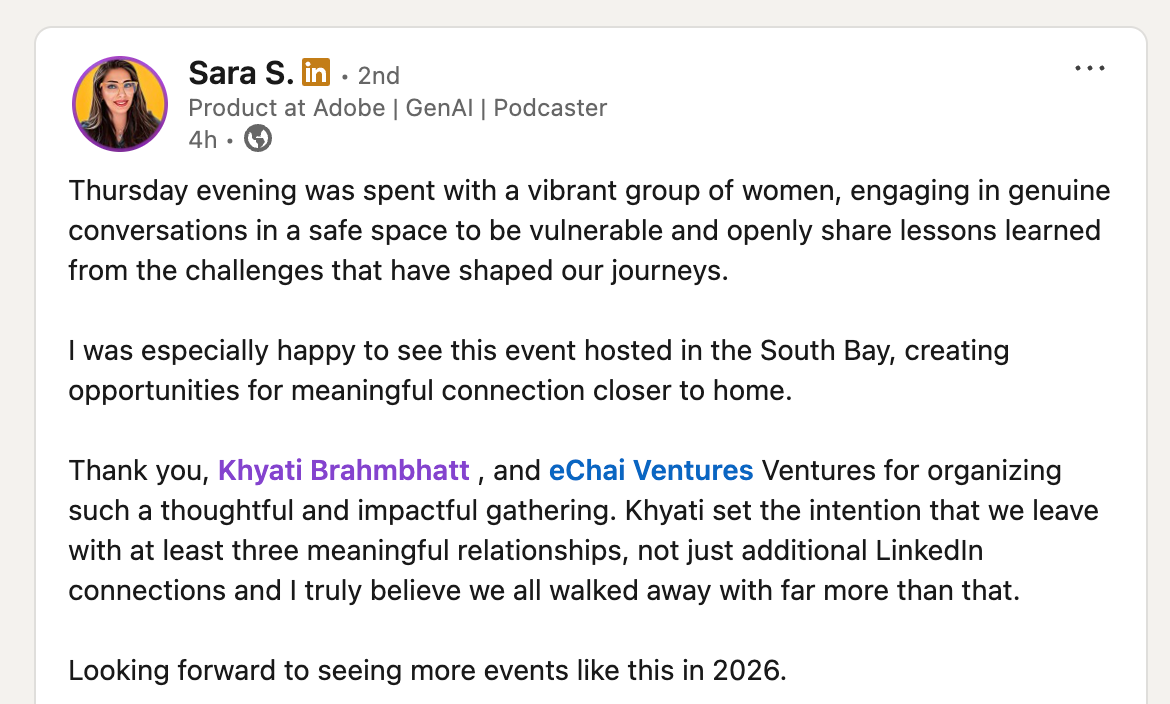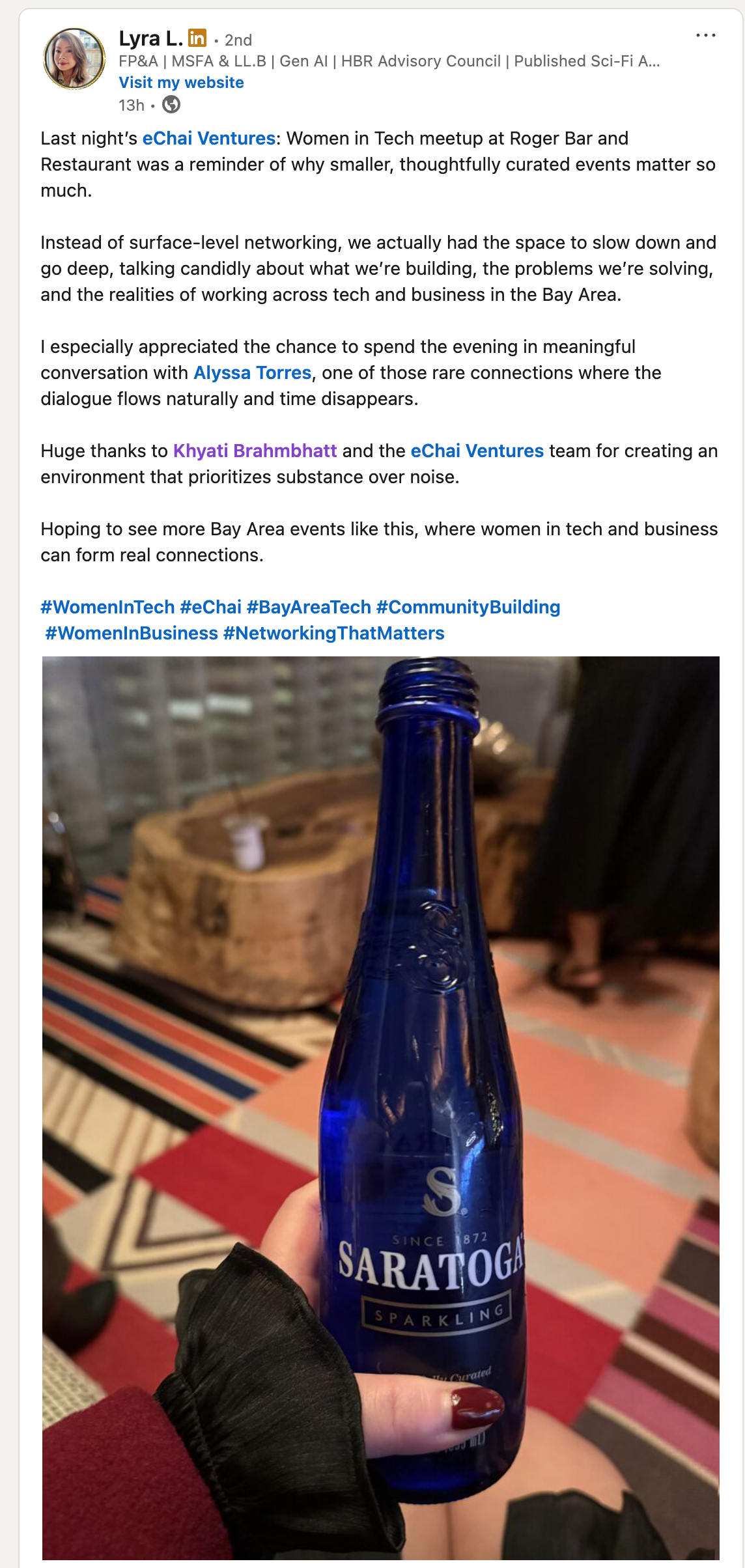Blessing in disguise
Books for Entrepreneurs
Documentary
eChai Wall of Love
How I Met My Co-Founder
In Focus Today
Insight Reports
Movies for Entrepreneurs
Notes from Podcasts
Slice of Startup Life
The First Hire
The First Welcome in Silicon Valley
The Reading Room
Unforgettable Lessons
Building Trust Takes the Longest - Soumya Kalluri (Dwij), from an eChai Mumbai Conversation

very rarely, I meet a founder
who has so much clarity and conviction.
meet Soumya Kalluri, founder of "Dwij" Products.
"Dwij" means second life in Sanskrit and that's exactly what she's doing by creating lifestyle products upcycling post consumer jeans and post industrial fabrics giving it a second life.
being a mechanical engineer herself, she has taken a journey from working in a stable profession to building a brand that is purposeful, sustainable as well as profitable.
we spoke about the first product she built, which, at the time seemed obvious but turned out to be not so obvious.
later, she shared how she researched, took real time feedback, understood what the consumers wanted and designed the products that her target audience would buy.
we also deep dived into building SOP's, operations, GTM strategies talking about how she's able to build quality products while upcycling jeans and other fabrics.
I asked her one specific question, what was harder?
- building the product
- building the demand
- or building the trust
her reply was simple: "building trust"
because you want your customers to come back and for that you have to focus on quality.
we concluded the event with her two cent advice for founders starting their journey in entrepreneurship and one question that every founder should reflect on.
it was a pleasure to host Soumya Kalluri at today's eChai Ventures Mumbai Start-up meet and learn so much from her.
thanks to Jatin Chaudhary & Harsha Bhurani for organising this meet-up and also everyone who joined us in this conversation by showing up and asking thoughtful questions.
who has so much clarity and conviction.
meet Soumya Kalluri, founder of "Dwij" Products.
"Dwij" means second life in Sanskrit and that's exactly what she's doing by creating lifestyle products upcycling post consumer jeans and post industrial fabrics giving it a second life.
being a mechanical engineer herself, she has taken a journey from working in a stable profession to building a brand that is purposeful, sustainable as well as profitable.
we spoke about the first product she built, which, at the time seemed obvious but turned out to be not so obvious.
later, she shared how she researched, took real time feedback, understood what the consumers wanted and designed the products that her target audience would buy.
we also deep dived into building SOP's, operations, GTM strategies talking about how she's able to build quality products while upcycling jeans and other fabrics.
I asked her one specific question, what was harder?
- building the product
- building the demand
- or building the trust
her reply was simple: "building trust"
because you want your customers to come back and for that you have to focus on quality.
we concluded the event with her two cent advice for founders starting their journey in entrepreneurship and one question that every founder should reflect on.
it was a pleasure to host Soumya Kalluri at today's eChai Ventures Mumbai Start-up meet and learn so much from her.
thanks to Jatin Chaudhary & Harsha Bhurani for organising this meet-up and also everyone who joined us in this conversation by showing up and asking thoughtful questions.
Hard Founder Choices We Don’t Talk About Enough

This weekend, Jatin Chaudhary invited me to speak on a panel of women founders for one of his eChai Ventures startup meet ups. I found myself speaking about lessons from my last 2 years, which honestly felt like 4!
Amid a roomful of aspiring and hustling entrepreneurs, Radhika Mohta was asking some very thoughtful questions about the hard pivots, the difficult exits, and the moments when a founder has to choose between staying and completion.
A few reflections and opinions I shared (and these are applicable to jobs/workplaces/clients also):
𝐎𝐧 𝐤𝐧𝐨𝐰𝐢𝐧𝐠 𝐰𝐡𝐞𝐧 𝐭𝐨 𝐥𝐞𝐚𝐯𝐞: There's a difference between quitting and completion. Quitting is running from hard things. Completion is honoring that your chapter has ended even if the book continues.
𝐎𝐧 𝐜𝐨-𝐟𝐨𝐮𝐧𝐝𝐞𝐫 𝐝𝐲𝐧𝐚𝐦𝐢𝐜𝐬: You can respect someone's skills deeply and still recognize you can't build together long-term. Both things can be true. The hard part is distinguishing between disagreement about tactics (healthy) and disagreement about values (terminal). The former you debate. The latter you exit.
𝐎𝐧 𝐰𝐡𝐚𝐭 𝐦𝐚𝐤𝐞𝐬 𝐚 "𝐬𝐮𝐜𝐜𝐞𝐬𝐬𝐟𝐮𝐥" 𝐞𝐱𝐢𝐭: Exits come in many forms - acquisition, IPO, shutdown, and also...walking away. The only bad exit is the one where you abandon your values to stay. This also applies to jobs we work every day.
𝐓𝐨 𝐦𝐲 𝐜𝐨-𝐩𝐚𝐧𝐞𝐥𝐢𝐬𝐭𝐬 𝐚𝐧𝐝 𝐟𝐨𝐮𝐧𝐝𝐞𝐫𝐬 𝐈 𝐬𝐩𝐨𝐤𝐞 𝐰𝐢𝐭𝐡 𝐚𝐟𝐭𝐞𝐫: thank you for trusting me with your stories. If my exits taught me anything, it's that the companies that didn't work out the way I planned forced me to ask the questions that are shaping who I am today.
What kind of founder do I want to be?
What's non-negotiable for me?
I wouldn't have asked those questions if everything had gone perfectly.
P.S - I was 15 minutes late to my own panel because Bangalore traffic had other plans. Some exits you can control. Some you just survive. But hey! I made it.
So will you.
Amid a roomful of aspiring and hustling entrepreneurs, Radhika Mohta was asking some very thoughtful questions about the hard pivots, the difficult exits, and the moments when a founder has to choose between staying and completion.
A few reflections and opinions I shared (and these are applicable to jobs/workplaces/clients also):
𝐎𝐧 𝐤𝐧𝐨𝐰𝐢𝐧𝐠 𝐰𝐡𝐞𝐧 𝐭𝐨 𝐥𝐞𝐚𝐯𝐞: There's a difference between quitting and completion. Quitting is running from hard things. Completion is honoring that your chapter has ended even if the book continues.
𝐎𝐧 𝐜𝐨-𝐟𝐨𝐮𝐧𝐝𝐞𝐫 𝐝𝐲𝐧𝐚𝐦𝐢𝐜𝐬: You can respect someone's skills deeply and still recognize you can't build together long-term. Both things can be true. The hard part is distinguishing between disagreement about tactics (healthy) and disagreement about values (terminal). The former you debate. The latter you exit.
𝐎𝐧 𝐰𝐡𝐚𝐭 𝐦𝐚𝐤𝐞𝐬 𝐚 "𝐬𝐮𝐜𝐜𝐞𝐬𝐬𝐟𝐮𝐥" 𝐞𝐱𝐢𝐭: Exits come in many forms - acquisition, IPO, shutdown, and also...walking away. The only bad exit is the one where you abandon your values to stay. This also applies to jobs we work every day.
𝐓𝐨 𝐦𝐲 𝐜𝐨-𝐩𝐚𝐧𝐞𝐥𝐢𝐬𝐭𝐬 𝐚𝐧𝐝 𝐟𝐨𝐮𝐧𝐝𝐞𝐫𝐬 𝐈 𝐬𝐩𝐨𝐤𝐞 𝐰𝐢𝐭𝐡 𝐚𝐟𝐭𝐞𝐫: thank you for trusting me with your stories. If my exits taught me anything, it's that the companies that didn't work out the way I planned forced me to ask the questions that are shaping who I am today.
What kind of founder do I want to be?
What's non-negotiable for me?
I wouldn't have asked those questions if everything had gone perfectly.
P.S - I was 15 minutes late to my own panel because Bangalore traffic had other plans. Some exits you can control. Some you just survive. But hey! I made it.
So will you.
At eChai SF, I saw women in tech show up for one another

Last night's Women in Tech event was a powerful reminder of the strength of our community.
What struck me most was witnessing women leaders who, despite navigating their own professional challenges, showed up with generosity and openness to mentor and support others. Their willingness to share both their struggles and their journeys demonstrated the kind of authentic leadership that creates real change.
The conversations were honest, the connections meaningful, and the energy in the room was a testament to how far we've come and how much further we can go together.
Next week, I'm heading to India visiting Ahmedabad, Bengaluru, Hyderabad and Jaipur, and I'm excited to connect with more women leaders in India's vibrant tech ecosystem. If you're in the area, I'd love to meet up.
The momentum around Women in Tech is building, and I'm particularly looking forward to the eChai Ventures Women in Tech Conference happening in Feb’26. I'll share more details as we get closer, but it is going to be an incredible gathering of leaders, innovators, and changemakers.
To every woman forging her path in tech: your journey matters, your voice matters, and you're not alone in this. Let's continue lifting each other up.
Happy Holidays…! ❤️
What struck me most was witnessing women leaders who, despite navigating their own professional challenges, showed up with generosity and openness to mentor and support others. Their willingness to share both their struggles and their journeys demonstrated the kind of authentic leadership that creates real change.
The conversations were honest, the connections meaningful, and the energy in the room was a testament to how far we've come and how much further we can go together.
Next week, I'm heading to India visiting Ahmedabad, Bengaluru, Hyderabad and Jaipur, and I'm excited to connect with more women leaders in India's vibrant tech ecosystem. If you're in the area, I'd love to meet up.
The momentum around Women in Tech is building, and I'm particularly looking forward to the eChai Ventures Women in Tech Conference happening in Feb’26. I'll share more details as we get closer, but it is going to be an incredible gathering of leaders, innovators, and changemakers.
To every woman forging her path in tech: your journey matters, your voice matters, and you're not alone in this. Let's continue lifting each other up.
Happy Holidays…! ❤️
The Soundboard Every Founder Should Have

There is something special about having a soundboard, especially when it grows naturally over time and isn’t something you consciously build, but slowly becomes part of your life as you keep meeting the same few people, talking often enough that conversations stop being guarded and start becoming honest.
With this kind of circle, you don’t need to arrive with clarity or confidence, you can speak while still figuring things out, repeat yourself, pause midway, go back to a thought later, and no one makes you feel like you’re wasting their time, they simply listen and stay with you until you’re done saying what you needed to say.
Most of the conversations do involve work because building something takes up so much mental space, but it never stays only about work, it naturally brings in everything else like how tired you’ve been feeling, how personal things affect decisions, and how sometimes the weight you’re carrying doesn’t come from one place but from many small ones.
What makes this space important is knowing that there is no judgment in this set up, no one is quietly comparing where you are or how fast you are moving, there’s no pressure to sound sorted or strong, and because of that, you are able to speak more honestly than you usually do.
I notice how these friends remember things over time, they remember what you were worried about weeks ago, they ask how that situation turned out, and sometimes they don’t even ask directly, they just check in gently, which makes you feel seen without having to explain yourself again.
Most days, I don’t necessarily walk away from these conversations with answers or plans, but I do walk away lighter, like saying things out loud with the right people has helped put them back in place, even if nothing on the outside has changed yet.
I am slowly realising that this kind of soundboard is not a small thing, especially for founders who are always thinking, deciding, and carrying a lot quietly, it helps you stay grounded, think clearly, and reminds you that you don’t have to figure everything out on your own.
Inside a Candid AI x Healthcare Circle in Silicon Valley

AI x Healthcare is where innovation is the hardest and the impact is the highest.
On Wednesday, I hosted eChai meetup filled with founders, builders, VCs, PMs, and operators working across HealthTech, MedTech, and BioTech.
It was not a generic AI meetup.
It was a real and unfiltered conversation about how healthcare innovation actually happens.
We spoke about:
• the gap between research, clinical validation, and real adoption
• how AI is reshaping diagnostics, trials, and care workflows
• productivity challenges inside hospitals and provider networks
• why healthcare fundraising looks nothing like SaaS
• what evidence means when lives are involved
• the operational reality of building in heavily regulated systems
• how laws and lawyers protect patients vs companies
The room had people building tools for researchers, clinicians, care teams, labs, and patients. Everyone came with different perspectives but the same mission: bring AI to the places where it can change lives, not just dashboards.
And in true Silicon Valley fashion, we met at Blue Bottle in Palo Alto where there happened to be another group meeting about the exact same topic. Only here can you walk into a cafe and accidentally run into ten more founders meeting for the same theme/topic. The density of ideas is unreal.
Grateful to everyone who showed up with depth, honesty, and clarity.
This is the kind of ecosystem energy that moves healthcare forward.
On Wednesday, I hosted eChai meetup filled with founders, builders, VCs, PMs, and operators working across HealthTech, MedTech, and BioTech.
It was not a generic AI meetup.
It was a real and unfiltered conversation about how healthcare innovation actually happens.
We spoke about:
• the gap between research, clinical validation, and real adoption
• how AI is reshaping diagnostics, trials, and care workflows
• productivity challenges inside hospitals and provider networks
• why healthcare fundraising looks nothing like SaaS
• what evidence means when lives are involved
• the operational reality of building in heavily regulated systems
• how laws and lawyers protect patients vs companies
The room had people building tools for researchers, clinicians, care teams, labs, and patients. Everyone came with different perspectives but the same mission: bring AI to the places where it can change lives, not just dashboards.
And in true Silicon Valley fashion, we met at Blue Bottle in Palo Alto where there happened to be another group meeting about the exact same topic. Only here can you walk into a cafe and accidentally run into ten more founders meeting for the same theme/topic. The density of ideas is unreal.
Grateful to everyone who showed up with depth, honesty, and clarity.
This is the kind of ecosystem energy that moves healthcare forward.

The eChai Effect - In Their Words
"eChai isn’t just a startup community … it’s a mindset . eChai has been one of the most impactful communities in my entrepreneurial journey. It’s been a turning point . In a world where building something can often feel isolating, eChai gave me a sense of belonging. I’ve found mentors, collaborators, and friends here — people who genuinely want to see you succeed. It’s a space where ideas are challenged, actions are celebrated, and founders grow not just in scale, but in clarity and confidence. From late-night ideas to early-morning pitches, this community has quietly but powerfully shaped the way I build, think, and dream. I’ll always be grateful for the way eChai creates spaces where founders don’t just grow businesses — they grow together."
Koumal Kalantry
Founder, Bignano Ventures
"I attended my first eChai event 3 yrs back, and no one knew me in the market. Over the next three years, eChai didn’t only help me with knowledge or networking, but it gave me an identity from being unknown to now being recognized by a group of inspirational entrepreneurs connected with eChai, who have been gracious enough to acknowledge me and Digipple."
Viraj Rajani
Co-Founder, Digipple
"I have evolved from role of Community Builder to Startup Consultant to Startup Ecosystem Enabler to Angel Investor and now launching a Venture Studio and eChai has been a catalyst in my overall journey as Startup Evangelist since 13 years."
Mehul Shah
Co-Founder at Counselvise & Ivy Growth
eChai Partner Brands
eChai Ventures partners with select brands as their growth partner - working together to explore new ideas, open doors, and build momentum across the startup ecosystem.


.jpg)